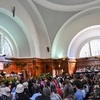Dworkin revisits academic freedom
28 May 2002
A LARGE assembly of academics, staff and members of the legal fraternity turned up in the Kramer Law Building to hear American Professor Ronald Dworkin deliver a seminar on Academic Freedom Revisited, the fourth presented under the auspices of the UCT Academic Freedom Committee.
Dworkin last spoke on academic freedom in South Africa at Wits University in March 1976, at a peak of student unrest in the country. Dworkin moved skilfully between theory and example, talking broadly about academic freedom as a value, contrasting the notion of academic freedom with freedom of speech and introducing some intriguing paradoxes within the higher learning environment.
"When I visited Johannesburg in 1976 the academic freedom debate in the US was dominated by McCarthyism. Liberals, whom the government attacked, championed academic freedom and the reformers, who warned against the 'red peril', opposed it. In a sense it was a 'clean battle'." But the debate had since shifted to include expressions of anti-Semitism, sexism and political extremism, where "such outrages against dignity" could not be protected under the guise of academic freedom.
In 1976, another debate in South African universities had centred on affirmative action. "That issue no longer remains, but there is a concern that government is using the universities as instruments of its own social policy in a way many people say offends the value of academic freedom. Similar issues arise within the university where academic freedom is at stake at two levels: whether a faculty takes charge of course design or whether the decision is taken by professional university administrators."
Dworkin also contrasted the values of academic freedom and freedom of speech. "Academic freedom draws on and distinguishes itself from freedom of speech, widely considered to be a general right. Academic freedom is a stronger right than anything that the general idea of freedom of speech connotes. But in another respect, academic freedom is more limiting than freedom of speech. Freedom of speech is available to everyone. Academic freedom is a privilege of certain academic institutions and no-one is entitled to membership in that institution."
He said that no institution had a right to exist if the government decided that its particular social and political purpose would be better served by funding a technical institution instead of a liberal arts institution. "No-one can complain that his freedom of speech has been violated because he doesn't have a particular institution that would be congenial to him in which to teach. So he can't say freedom of speech is connected to academic freedom. They seem in the same neighbourhood, but they're different values."
Dworkin said that in order to arrive at a conception of academic freedom one first had to ascertain where its value lay. "This should also be an attempt to explore the similarities and differences between that right and the more general right of free speech. Some might say that government has the moral responsibility to decide what kind of academic institution to build, where it should be located and what should be taught to best serve government's interests. But our instincts of academic freedom tell us that government should not pursue its direction into the workings of that university. That seems paradoxical. If it can make macro decisions, then on what basis would it not make micro decisions?"
Dworkin took this example down one level to where the university "confronted" the individual members of its faculties. "If a university can collectively decide who should be on its faculty and who should be hired, why can it not micro-manage? Once a professor has been hired why can't they say: 'We see what you are doing is not what we expected. Change the direction of your research or leave'? That, in our instincts, would be a violation of academic freedom so that introduces a second paradox."
He urged the university to keep these paradoxes in mind as challenges. "It's often said that academic freedom, like freedom of speech, rests on the premise that the best strategy for reaching truth is to let universities run their own affairs, appointing professors who make their own decisions about research and teaching. If we follow that strategy we'll do a better job in discerning the truth than if we interfere in ways that violate academic freedom."
The full seminar is available on video.
Dworkin last spoke on academic freedom in South Africa at Wits University in March 1976, at a peak of student unrest in the country. Dworkin moved skilfully between theory and example, talking broadly about academic freedom as a value, contrasting the notion of academic freedom with freedom of speech and introducing some intriguing paradoxes within the higher learning environment.
"When I visited Johannesburg in 1976 the academic freedom debate in the US was dominated by McCarthyism. Liberals, whom the government attacked, championed academic freedom and the reformers, who warned against the 'red peril', opposed it. In a sense it was a 'clean battle'." But the debate had since shifted to include expressions of anti-Semitism, sexism and political extremism, where "such outrages against dignity" could not be protected under the guise of academic freedom.
In 1976, another debate in South African universities had centred on affirmative action. "That issue no longer remains, but there is a concern that government is using the universities as instruments of its own social policy in a way many people say offends the value of academic freedom. Similar issues arise within the university where academic freedom is at stake at two levels: whether a faculty takes charge of course design or whether the decision is taken by professional university administrators."
Dworkin also contrasted the values of academic freedom and freedom of speech. "Academic freedom draws on and distinguishes itself from freedom of speech, widely considered to be a general right. Academic freedom is a stronger right than anything that the general idea of freedom of speech connotes. But in another respect, academic freedom is more limiting than freedom of speech. Freedom of speech is available to everyone. Academic freedom is a privilege of certain academic institutions and no-one is entitled to membership in that institution."
He said that no institution had a right to exist if the government decided that its particular social and political purpose would be better served by funding a technical institution instead of a liberal arts institution. "No-one can complain that his freedom of speech has been violated because he doesn't have a particular institution that would be congenial to him in which to teach. So he can't say freedom of speech is connected to academic freedom. They seem in the same neighbourhood, but they're different values."
Dworkin said that in order to arrive at a conception of academic freedom one first had to ascertain where its value lay. "This should also be an attempt to explore the similarities and differences between that right and the more general right of free speech. Some might say that government has the moral responsibility to decide what kind of academic institution to build, where it should be located and what should be taught to best serve government's interests. But our instincts of academic freedom tell us that government should not pursue its direction into the workings of that university. That seems paradoxical. If it can make macro decisions, then on what basis would it not make micro decisions?"
Dworkin took this example down one level to where the university "confronted" the individual members of its faculties. "If a university can collectively decide who should be on its faculty and who should be hired, why can it not micro-manage? Once a professor has been hired why can't they say: 'We see what you are doing is not what we expected. Change the direction of your research or leave'? That, in our instincts, would be a violation of academic freedom so that introduces a second paradox."
He urged the university to keep these paradoxes in mind as challenges. "It's often said that academic freedom, like freedom of speech, rests on the premise that the best strategy for reaching truth is to let universities run their own affairs, appointing professors who make their own decisions about research and teaching. If we follow that strategy we'll do a better job in discerning the truth than if we interfere in ways that violate academic freedom."
The full seminar is available on video.
 This work is licensed under a Creative Commons Attribution-NoDerivatives 4.0 International License.
This work is licensed under a Creative Commons Attribution-NoDerivatives 4.0 International License.
Please view the republishing articles page for more information.
Related
‘Welcome to the global centre of excellence’
04 Feb 2026










